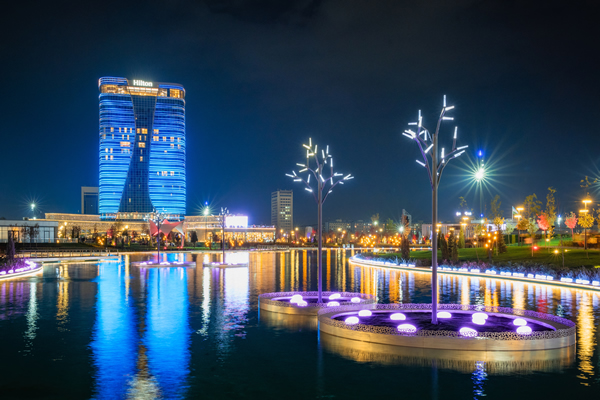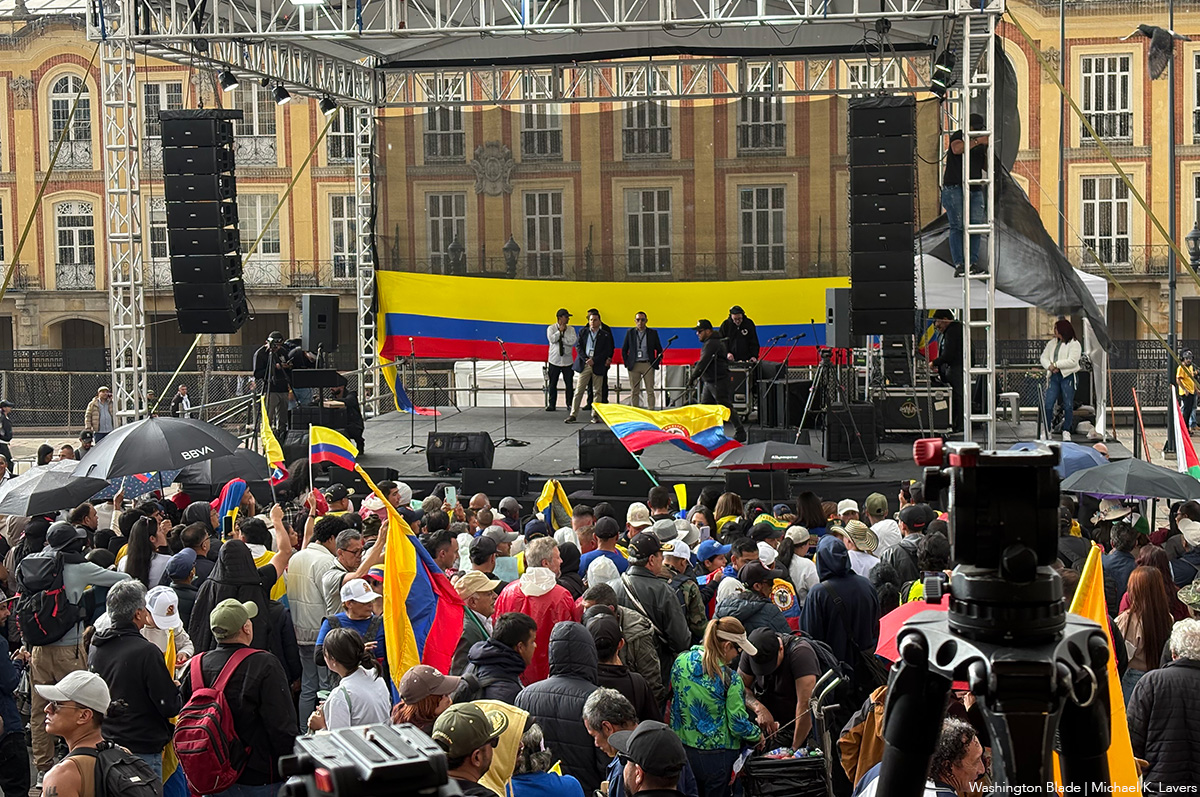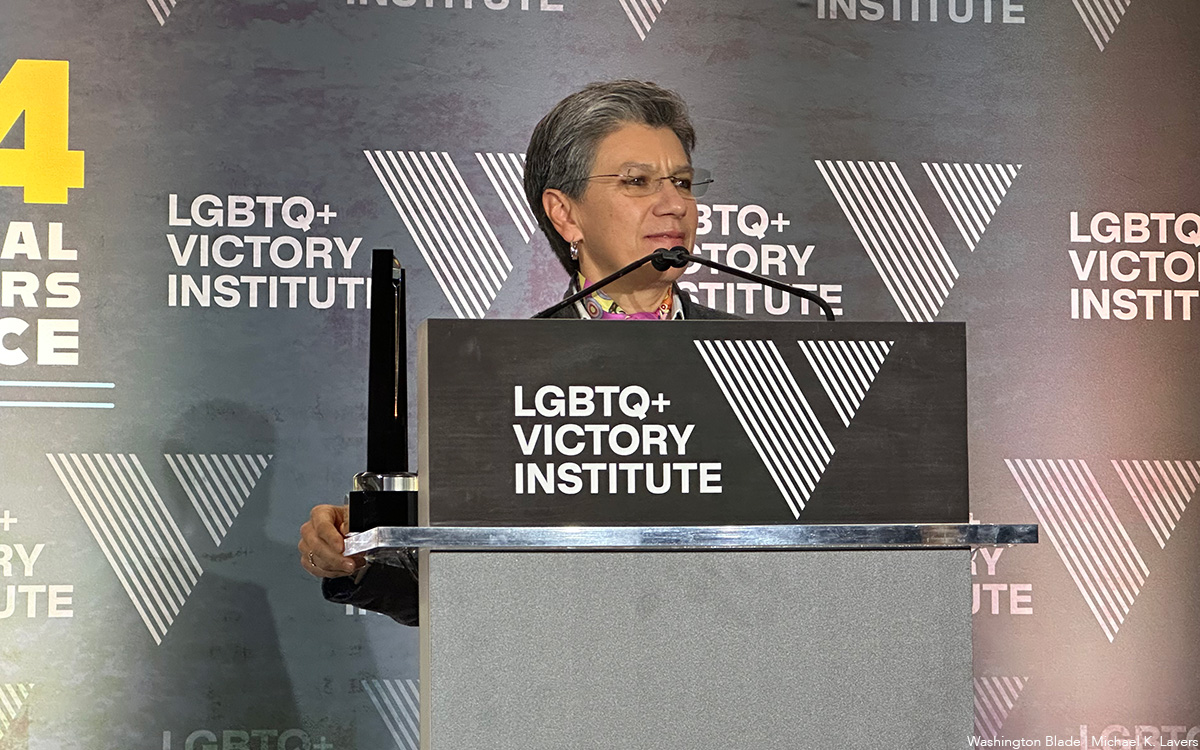World
LGBTQ activism in Uzbekistan ‘is almost impossible’
Human rights activist speaks after call to end so-called anal tests

A human rights activist in Uzbekistan says LGBTQ people in their country continue to live in fear.
“Members of the LGBT community continue to be intimidated,” the human rights activist told the Washington Blade this week. “Activism and protection of the rights of LGBT representatives is almost impossible in the country.”
“There are no mechanisms that would somehow help people who are already in a complex psycho-emotional state,” added the human rights activist. “It is not possible to ask for help if you suffered on the basis of your sexual orientation; either from law enforcement agencies, doctors, psychologists or other structures that should provide this assistance.”
Uzbekistan is among the dozens of countries in which consensual same-sex sexual relations remain criminalized.
Human Rights Watch; the Council for Global Equality; the Eurasian Coalition on Health, Rights, Gender and Sexual Diversity; Freedom Now; Human Dignity Trust; the Human Rights Campaign; ILGA-Europe; the International Partnership for Human Rights and the Lesbian and Gay Federation in Germany in an Aug. 5 press release noted Uzbek authorities between 2017 and this year have subjected at least six men to so-called anal exams to prove they engaged in consensual same-sex sexual relations. The groups urged President Shavkat Mirziyoyev to immediately ban this practice.
“Forced anal examinations, and their use in seeking convictions for consensual same-sex conduct, are an appalling violation of basic rights that diminishes Uzbekistan’s efforts to make its poor human rights record a thing of the past,” said Human Rights Watch Associate LGBT Rights Director Neela Ghoshal in the press release. “The Uzbek government has been vocal about its intent to make human rights reforms, yet persists in using a discredited, abusive procedure that amounts to torture.”
The human rights activist spoke with the Blade days after Human Rights Watch and the other groups urged the Uzbek government to ban anal exams. The Blade on Thursday reached out to the Uzbek government, the Uzbek Embassy in D.C. and Uzbek Ambassador to the U.S. Javlon Vakhabov for comment.
This is Michael Lavers from the @WashBlade in the U.S. Does @govuz have any comment on the Human Rights Watch report on forced anal testing in homosexuality prosecutions? https://t.co/at7uEKdQBm @Dunyo_IA @UZEmbassyDC @JavlonVakhabov @usembtashkent
— Michael K. Lavers (He/Él) (@mklavers81) August 12, 2021
Uzbekistan is a former Soviet republic in Central Asia that borders Kazakhstan, Kyrgyzstan, Tajikistan, Turkmenistan and Afghanistan. Mirziyoyev has been Uzbekistan’s president since 2016.
The human rights activist — who asked the Blade not to publish their name — said Mirziyoyev promised “radical changes in all areas, especially in the field of human rights.”
“The entire world community, like the entire population of Uzbekistan, expected global changes in these areas, but almost five years have passed since he has been in power and much that was promised was simply forgotten or rejected under various pretexts,” said the human rights activist. “During all five years of government as president in the field of LGBT rights, nothing was done except aggravating the situation and worsening the situation of the LGBT community in Uzbekistan.”
The human rights activist noted Article 120 of the Uzbek penal code “is directed primarily against men, but the presence of an article in society is perceived as a ban on the entire LGBT community.” They also said efforts to decriminalize homosexuality in Uzbekistan have been “rejected, citing the thinking of civil society.”
The human rights activist told the Blade that prominent politicians and religious officials in their country publicly say LGBTQ people should undergo treatment, lose their citizenship and be destroyed.
A new criminal code that Uzbek lawmakers approved in February contains a provision that addresses “crimes against morals, youth and family.” The human rights activist with whom the Blade spoke sarcastically said “it turns out that the LGBT community in the country is the culprit of problems in families, in young people.”
“Representatives of the LGBT community in Uzbekistan have no protection and no rights,” said the human rights activist. “In addition, the lack of support from civil society, the imposition of a negative image of the LGBT community on people deprive them of the support of civil society, because people have been introduced to the idea that if you are willing to help the LGBT community, then you are necessarily part of them and should be subject to punishment.”
“Open homophobia and unleashed hands of law enforcement agencies allow the use of any methods of pressure and torture on people who are charged under Article 120, because no one will help in this situation,” added the human rights activist.
The human rights activist told the Blade that they welcome the call for Mirziyoyev to ban anal tests in Uzbekistan. The human rights activist added they are hopeful the U.S. and European Union can potentially spur Mirziyoyev’s government to do more to protect LGBTQ Uzbeks.
“The hope of the LGBT community of Uzbekistan is connected precisely with the possibility of influence from the government of America and the European Union on this issue,” said the human rights activist, while adding the pandemic has forced the U.S. and European countries to shift their priorities.
The human rights activist noted Uzbekistan is a member of the U.N. Human Rights Council and “has undertaken to promote and protect human rights and to adopt a number of legislative, institutional and administrative measures to fulfill its international human rights obligations, and has undertaken to protect, promote and uphold universal human rights and fundamental freedoms for all.”
The human rights activist also pointed out the EU does not impose tariffs on goods it imports from Uzbekistan.
“The EU made concessions to Uzbekistan in this matter when it gave it the status of its partner,” they noted. “But at the same time Uzbekistan is not confused in fulfilling its obligations.”
Colombia
Colombians protest against Trump after he threatened country’s president
Tens of thousands protested the US president in Bogotá

BOGOTÁ, Colombia — Tens of thousands of people on Wednesday gathered in the Colombian capital to protest against President Donald Trump after he threatened Colombian President Gustavo Petro.
The protesters who gathered in Plaza Bolívar in Bogotá held signs that read, among other things, “Yankees go home” and “Petro is not alone.” Petro is among those who spoke.
The Bogotá protest took place four days after American forces seized now former Venezuelan President Nicolás Maduro and his wife, Cilia Flores, at their home in Caracas, the Venezuelan capital, during an overnight operation.
The Venezuelan National Assembly on Sunday swore in Delcy Rodríguez, who was Maduro’s vice president, as the country’s acting president. Maduro and Flores on Monday pleaded not guilty to federal drug charges in New York.
Trump on Sunday suggested the U.S. will target Petro, a former Bogotá mayor and senator who was once a member of the M-19 guerrilla movement that disbanded in the 1990s. Claudia López, a former senator who would become the country’s first female and first lesbian president if she wins Colombia’s presidential election that will take place later this year, is among those who criticized Trump’s comments.
The Bogotá protest is among hundreds against Trump that took place across Colombia on Wednesday.
Petro on Wednesday night said he and Trump spoke on the phone. Trump in a Truth Social post confirmed he and his Colombian counterpart had spoken.
“It was a great honor to speak with the president of Colombia, Gustavo Petro, who called to explain the situation of drugs and other disagreements that we have had,” wrote Trump. “I appreciated his call and tone, and look forward to meeting him in the near future. Arrangements are being made between Secretary of State Marco Rubio and the foreign minister of Colombia. The meeting will take place in the White House in Washington, D.C.”

Colombia
Gay Venezuelan man who fled to Colombia uncertain about homeland’s future
Heberth Aguirre left Maracaibo in 2018

BOGOTÁ, Colombia — A gay Venezuelan man who has lived in Colombia since 2018 says he feels uncertain about his homeland’s future after the U.S. seized now former Venezuelan President Nicolás Maduro.
“On one hand I can feel happy, but on the other hand I feel very concerned,” Heberth Aguirre told the Washington Blade on Tuesday during an interview at a shopping mall in Bogotá, the Colombian capital.
Aguirre, 35, is from Maracaibo, Venezuela’s second-largest city that is the heart of the country’s oil industry.
He developed cultural and art initiatives for the Zulia State government.
“Little by little, I suddenly became involved in politics because, in a way, you had to be involved,” recalled Aguirre. “It was necessary to be involved because the regime often said so.”
“I basically felt like I was working for the citizens, but with this deeply ingrained rule we had to be on their side, on the side of the Maduro and (former President Hugo) Chávez regime,” he added.
Maduro in 2013 became Venezuela’s president after Chávez died.
“There are things I don’t support about the regime,” Aguirre told the Blade. “There are other things that were nice in theory, but it turned out that they didn’t work when we put them into practice.”
Aguirre noted the Maduro government implemented “a lot of laws.” He also said he and other LGBTQ Venezuelans didn’t “have any kind of guarantee for our lives in general.”
“That also exposed you in a way,” said Aguirre. “You felt somewhat protected by working with them (the government), but it wasn’t entirely true.”
Aguirre, 35, studied graphic design at the University of Zulia in Maracaibo. He said he eventually withdrew after soldiers, members of Venezuela’s Bolivarian National Guard, and police officers opened fire on students.
“That happened many times, to the point where I said I couldn’t keep risking my life,” Aguirre told the Blade. “It hurt me to see what was happening, and it hurt me to have lost my place at the university.”
Venezuela’s economic crisis and increased insecurity prompted Aguirre to leave the country in 2018. He entered Colombia at the Simón Bolívar Bridge near the city of Cúcuta in the country’s Norte de Santander Province.
“If you thought differently, they (the Venezuelan government) would come after you or make you disappear, and nobody would do anything about it,” said Aguirre in response to the Blade’s question about why he left Venezuela.
The Simón Bolívar Bridge on the Colombia-Venezuela border on May 14, 2019. (Washington Blade video by Michael K. Lavers)
Aguirre spoke with the Blade three days after American forces seized Maduro and his wife, Cilia Flores, at their home in Caracas, the Venezuelan capital, during an overnight operation.
The Venezuelan National Assembly on Sunday swore in Delcy Rodríguez, who was Maduro’s vice president, as the country’s acting president. Maduro and Flores on Monday pleaded not guilty to federal drug charges in New York.
President Donald Trump on Tuesday in a Truth Social post said Venezuela’s interim authorities “will be turning over between 30 and 50 million barrels of high quality, sanctioned oil, to the United States of America.”
“This oil will be sold at its market price, and that money will be controlled by me, as president of the United States of America, to ensure it is used to benefit the people of Venezuela and the United States,” wrote Trump.
Trump on Sunday suggested the U.S. will target Colombian President Gustavo Petro, a former Bogotá mayor and senator who was once a member of the M-19 guerrilla movement that disbanded in the 1990s.
Petro has urged Colombians to take to the streets on Wednesday and “defend national sovereignty.” Claudia López, a former senator who would become the country’s first female and first lesbian president if she wins Colombia’s presidential election that will take place later this year, is among those who criticized Trump’s comments.
“Let’s be clear: Trump doesn’t care about the humanitarian aspect,” said Aguirre when the Blade asked him about Trump. “We can’t portray him as Venezuela’s savior.”
Meanwhile, Aguirre said his relatives in Maracaibo remain afraid of what will happen in the wake of Maduro’s ouster.
“My family is honestly keeping quiet,” he said. “They don’t post anything online. They don’t go out to participate in marches or celebrations.”
“Imagine them being at the epicenter, in the eye of the hurricane,” added Aguirre. “They are right in the middle of all the problems, so it’s perfectly understandable that they don’t want to say anything.”
‘I never in my life thought I would have to emigrate’
Aguirre has built a new life in Bogotá.
He founded Mesa Distrital LGBTIQ+ de Jóvenes y Estudiantes, a group that works with migrants from Venezuela and other countries and internally placed Colombians, during the COVID-19 pandemic. Aguirre told the Blade he launched the group “with the need to contribute to the general population, not just in Colombia.”
Aguirre met his husband, an American from California, at a Bogotá church in December 2020 during a Christmas event that SDA Kinship Colombia, an LGBTQ group, organized. A Utah judge virtually officiated their wedding on July 12, 2024.
“I love Colombia, I love Bogotá,” said Aguirre. “I love everything I’ve experienced because I feel it has helped me grow.”
He once again stressed he does not know what a post-Maduro Venezuela will look like.
“As a Venezuelan, I experienced the wonders of that country,” said Aguirre. “I never in my life thought I would have to emigrate.”
The Colombian government’s Permiso por Protección Temporal program allows Aguirre and other Venezuelans who have sought refuge in Colombia to live in the country for up to 10 years. Aguirre reiterated his love for Colombia, but he told the Blade that he would like to return to Venezuela and help rebuild the country.
“I wish this would be over in five years, that we could return to our country, that we could go back and even return with more skills acquired abroad,” Aguirre told the Blade. “Many of us received training. Many of us studied a lot. We connected with organizations that formed networks, which enriched us as individuals and as professionals.”
“Returning would be wonderful,” he added. “What we’ve built abroad will almost certainly serve to enrich the country.”
Colombia
Claudia López criticizes Trump over threats against Colombian president
Presidential candidate would become country’s first lesbian head of government

BOGOTÁ, Colombia — Colombian presidential candidate Claudia López has criticized President Donald Trump after he suggested the U.S. will target Colombian President Gustavo Petro.
“Colombia is very sick, too, run by a sick man, who likes making cocaine and selling it to the United States, and he’s not going to be doing it very long,” Trump told reporters on Air Force One on Sunday.
Trump made the comments a day after American forces carried out an overnight operation and seized now former Venezuelan President Nicolás Maduro and wife, Cilia Flores, at their home in Caracas, the Venezuelan capital.
Maduro and Flores on Monday pleaded not guilty to federal drug charges in New York.
Petro is a former Bogotá mayor and senator who was once a member of the M-19 guerrilla movement that disbanded in the 1990s. He has urged Colombians to take to the streets and “defend national sovereignty.”
“Colombians are the ones who decide who governs Colombia,” said López on her X account. “President Gustavo Petro won free elections and has a constitutional mandate.”
López did not mention Trump by name in her comment.
The first-round of Colombia’s presidential election will take place on May 31. The country’s 1991 constitution prevents Petro from seeking re-election.
López in 2019 became the first woman and first lesbian elected mayor of Bogotá, the Colombian capital and the country’s largest city. She took office on Jan. 1, 2020, less than a month after she married her wife, Colombian Sen. Angélica Lozano.
“This year we will decide at the polls what direction (the country) is heading and what leadership will advance Colombia,” said López in her X post. “Supporting soft dictatorships and attacking democracies is an absurd and unacceptable political action by the United States towards Colombia, Venezuela, and Latin America.”
Quién gobierna en Colombia lo decidimos los colombianos.
El presidente @petrogustavo ganó unas elecciones libres y tiene un mandato constitucional. Este año decidiremos en las urnas qué rumbo y a cargo de qué liderazgo avanza Colombia.
Sostener dictablandas y atacar democracias… https://t.co/K61G2QUcck— Claudia López Hernández (@ClaudiaLopez) January 5, 2026
López would be Colombia’s first female president if she wins the election. López would also become the third openly lesbian woman elected head of government — Jóhanna Sigurðardóttir was Iceland’s prime minister from 2009-2013 and Ana Brnabić was Serbia’s prime minister from 2017-2024.
The LGBTQ+ Victory Institute in 2024 honored López at its annual International LGBTQ Leaders Conference in D.C. The Washington Blade interviewed her during the gathering.
-

 Photos5 days ago
Photos5 days agoThe year in photos
-

 Sponsored4 days ago
Sponsored4 days agoSafer Ways to Pay for Online Performances and Queer Events
-

 District of Columbia3 days ago
District of Columbia3 days agoTwo pioneering gay journalists to speak at Thursday event
-

 a&e features3 days ago
a&e features3 days agoQueer highlights of the 2026 Critics Choice Awards: Aunt Gladys, that ‘Heated Rivalry’ shoutout and more




















